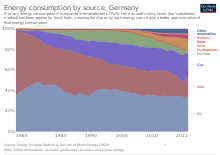
Back الطاقة في ألمانيا Arabic Энергетыка Германіі Byelorussian Deutsche Energiewirtschaft German انرژی در آلمان Persian Energia Saksassa Finnish Énergie en Allemagne French Energi di Jerman ID 독일의 에너지 Korean Энергетика Германии Russian Almanya'da enerji Turkish
The article's lead section may need to be rewritten. (December 2023) |


Energy in Germany is obtained for the vast majority from fossil sources, accounting for 77.6% of total energy consumption in 2023, followed by renewables at 19.6%, and 0.7% nuclear power.[1][2] As of 2023, German primary energy consumption amounted to 10,791 Petajoule, making it the ninth largest global primary energy consumer. The total consumption has been steadily declining from its peak of 14,845 Petajoule in 2006.[3][2] In 2023 Germany's gross electricity production reached 508.1 TWh,[1] down from 569.2 TWh in 2022, and 631.4 TWh in 2013.[4]
Key to Germany's energy policies and politics is the "Energiewende", meaning "energy turnaround" or "energy transformation". The policy includes nuclear phaseout (completed in 2023) and progressive replacement of fossil fuels by renewables. The nuclear electricity production lost in Germany's phase-out was primarily replaced with coal electricity production and electricity importing. One study found that the nuclear phase-out caused $12 billion in social costs per year, primarily due to increases in mortality due to exposure to pollution from fossil fuels.[5] Germany has been called "the world's first major renewable energy economy".[6][7]
Prior to the 2022 Russian invasion of Ukraine, Germany was highly dependent on Russian energy, accounting for half of its natural gas, a third of heating oil, and half of its coal imports from Russia.[8][9] Due to this reliance, Germany blocked, delayed or watered down EU proposals to cut Russian energy imports amid the 2022 Russian invasion of Ukraine.[10][11][12] However, the Russian invasion resulted in a radical shift in Germany's energy policy, with the goal of being almost completely independent of Russian energy imports by mid-2024.[13]
- ^ a b Cite error: The named reference
bdew2023was invoked but never defined (see the help page). - ^ a b "Germany's energy consumption and power mix in charts". Clean Energy Wire. 22 December 2023. Retrieved 8 January 2024.
- ^ "Primary energy consumption worldwide in 2022, by country". Archived from the original on 24 November 2023. Retrieved 11 January 2024.
- ^ Cite error: The named reference
energwas invoked but never defined (see the help page). - ^ Jarvis, Stephen; Deschenes, Olivier; Jha, Akshaya (2019). "The Private and External Costs of Germany's Nuclear Phase-Out". Journal of the European Economic Association. 20 (3): 1311–1346. doi:10.1093/jeea/jvac007. Archived from the original on 11 October 2022. Retrieved 7 April 2022.
{{cite journal}}: CS1 maint: bot: original URL status unknown (link) - ^ "Germany: The World's First Major Renewable Energy Economy". Archived from the original on 29 March 2015. Retrieved 24 January 2012.
- ^ Fraunhofer ISE, Electricity production from solar and wind in Germany – New record in wind power production, p.2 15 December 2014
- ^ Eddy, Melissa (5 April 2022). "Why Germany Can't Just Pull the Plug on Russian Energy". The New York Times. ISSN 0362-4331. Archived from the original on 7 April 2022. Retrieved 7 April 2022.
- ^ Gross, Stephen G. (2023), "The Energy Entanglement of Germany and Russia", Energy and Power, Oxford University Press, pp. 238–266, doi:10.1093/oso/9780197667712.003.0010, ISBN 978-0-19-766771-2
- ^ Guarascio, Francesco (7 April 2022). "EU's full ban on Russian coal to be pushed back to mid-August -sources". Reuters. Archived from the original on 7 April 2022. Retrieved 7 April 2022.
- ^ Wearden, Graeme; Rankin, Jennifer; Elliott, Larry; Neate, Rupert; Jolly, Jasper; Davies, Rob (7 March 2022). "German chancellor Scholz pushes back against Russian energy import ban, as oil and gas climb – as it happened". The Guardian. ISSN 0261-3077. Archived from the original on 7 April 2022. Retrieved 7 April 2022.
- ^ "Germany resists EU ban on Russian gas as bloc prepares new sanctions". Reuters. 4 April 2022. Archived from the original on 6 April 2022. Retrieved 7 April 2022.
- ^ "Germany Targets End to Russian Gas Imports by Middle of 2024". BNN Bloomberg. 25 March 2022. Archived from the original on 24 August 2022. Retrieved 24 August 2022.
© MMXXIII Rich X Search. We shall prevail. All rights reserved. Rich X Search